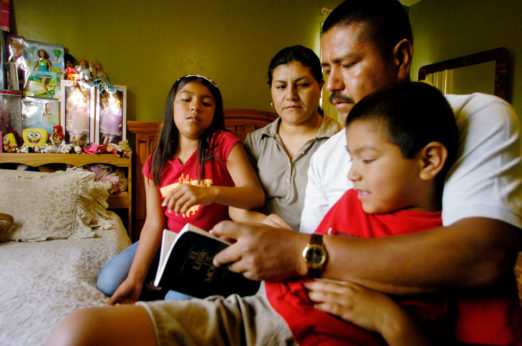
WASHINGTON – Union leaders, Latino group leaders, and constitutional scholars all slammed right-wing GOP President Donald Trump’s declaration that he would craft an executive order to end “birthright citizenship” in the U.S. – a move that could affect millions of people.
The scholars bluntly pointed out Trump constitutionally can’t revoke birthright citizenship, since the 14th Amendment, enacted 150 years ago, explicitly says anyone born or naturalized in the U.S. is a citizen.
Lawmakers enacted it then, several experts pointed out, to override the U.S. Supreme Court’s most-infamous ruling, the Dred Scott case, where its majority ruled blacks were only slaves with no rights.
Several of the scholars, and many leaders, also hit Trump’s scheme as a campaign stunt, designed to rile up his nativist base and drive them to the polls on Nov. 6. In a further incendiary move, GOP campaign committees, responding to Trump, released a campaign ad on Nov. 1 calling immigrants “cop-killers.”
“Even Republicans are gasping at the idea” of yanking U.S. citizenship away from people, said Baldemar Velasquez, president of the Farm Labor Organizing Committee (FLOC), in a telephone interview. “This is an astounding act of cruelty” by Trump, he added.
It’s also worried his members and their kids, said Velasquez, whose union is predominantly Latino. With Trump also sending troops to the U.S. border to stop a slow-moving group of refugees and asylum-seekers walking through Mexico from Central America – FLOC members “worry that he could line up the immigrants at the border and shoot them.” Most of the walkers are women and children.
“He’s also blaming the Dreamers” – people who were brought to the U.S. as toddlers, who are now in college, the military or in jobs – “for nothing they did wrong,” Velasquez said. Trump tried to throw the 800,000 Dreamers out of the U.S., too, by ending the program that kept them here. Courts stopped him.
Other union and Hispanic leaders, in statements, also slammed Trump, as did the constitutional scholars, even those writing for conservative publications, such as the National Review.
“Trump’s attempt to stoke prejudice among his base before the election by claiming he can eliminate birthright citizenship via E.O. is why we must change the balance of power in Congress. This bigoted rhetoric creates division, fear & hatred,” added Farm Workers President Arturo Rodriguez in a tweet.
Latino groups are not the only ones whom Trump upset. Asian Pacific American Labor Alliance Executive Director Alvina Yeh said of his scheme: “Not only is this unconstitutional, it is un-American and unapologetically a scare tactic a week before the elections.”
“We are not fooled,” she continued. “We will continue defending the 14th Amendment as the Supreme Court did in 1898 when white nationalists tried to revoke 14th amendment rights for Chinese people. It is no coincidence the 1898 case occurred during the height of anti-immigrant frenzy as it has today.”
“Birthright citizenship is a part of the foundation of our Constitution and American values. We stand united with other immigrant communities who will continue to oppose and resist this Administration’s white supremacist, anti-immigrant agenda,” Yeh stated.

Janet Marguia, president of UnidosUS – the former National Council of La Raza Unida – actually warned people about Trump’s 14th Amendment revocation scheme two years ago in a speech in Phoenix.
“Trump doubled down on an immigration platform that continues to be based on falsehoods, distortions and dog whistles culled directly from the most extreme elements of the anti-immigrant movement,” she said then.
“Experts agree a mass deportation strategy would blow a hole through the budget, reduce economic growth and tax revenues, result in massive violations of civil rights, tear families apart, and potentially remove millions of U.S. citizens from the land of their birth,” she said. That strategy, she noted, included his “try to change the Constitution to eliminate birthright citizenship.”
A Moslem-American group, the American Human Rights Council, hit the same themes, including Trump’s use of it to rile up his political base. Trump is also known – and condemned – for his anti-Moslem rhetoric and for his executive order banning travel into the U.S. of anyone from selected Moslem-majority countries, on supposed “terrorism” and “national security” grounds. Courts reversed the ban several times on grounds of unconstitutional bias. After it became more specific, the U.S. Supreme Court, in its usual 5-4 partisan split, upheld the Moslem ban.
“The weakest members of American society are callously being used by President Trump for political expediency and that is unconscionable,” said AHRC Executive Director Ihad Ahmad. He cited the “toxicity emanating chiefly from the White House,” but added, “going after the children of immigrants that are born in the U.S. is a new low.”
“These rhetorical attacks pave the way for shameful policies,” including Trump’s “proposal to end birthright citizenship,” said the Washington Office on Latin America, a think tank that tracks Latin American issues and developments, along with U.S. policy responses.
“These are not only threats: These are serious attacks against people’s rights and the values on which this country was founded…Sadly, we have come to expect hateful and discriminatory language from the president and many of his followers. Such speech is neither normal nor acceptable, and must stop.”
“Leaders of all political persuasions must denounce hate speech immediately when it occurs. We should not need to experience horrific hate crimes and violence to understand the potential harm of hate speech, especially when coming from the leader of a nation that purports to hold itself to a high moral standard.”
Velasquez cited another big reason for Trump’s anti-Latino anti-immigrant stands: He ignores U.S. policy south of the border. And all the measures Trump advocates, including his infamous wall, won’t change that history, he said. “If we had a government that really dealt with the issues of inequality and poverty that we created” in Mexico, Guatemala, Honduras, and Nicaragua, “they (the refugees) would be able to stay home and make a living,” Velasquez concluded.










